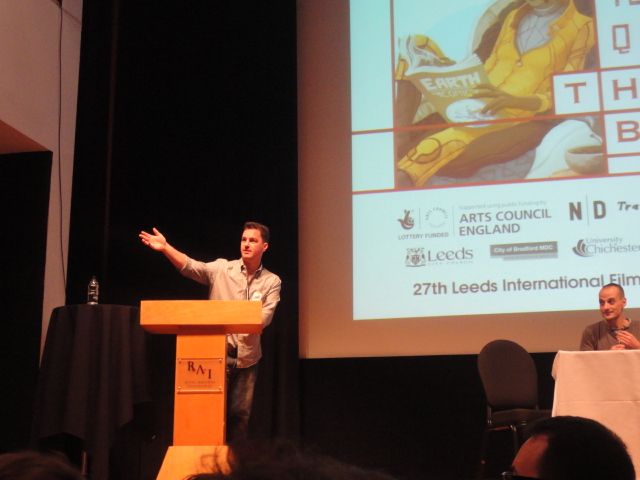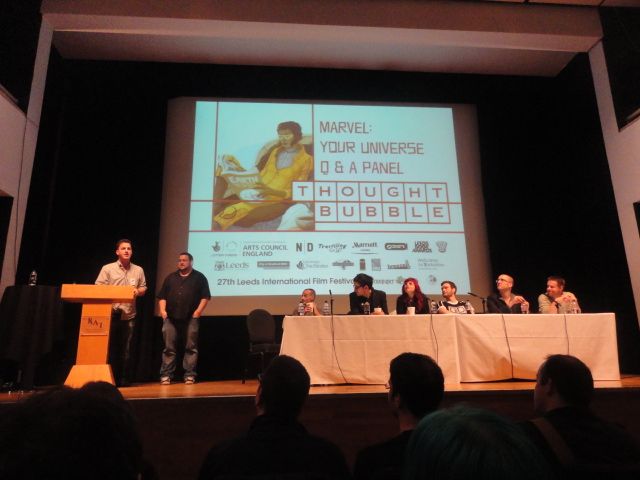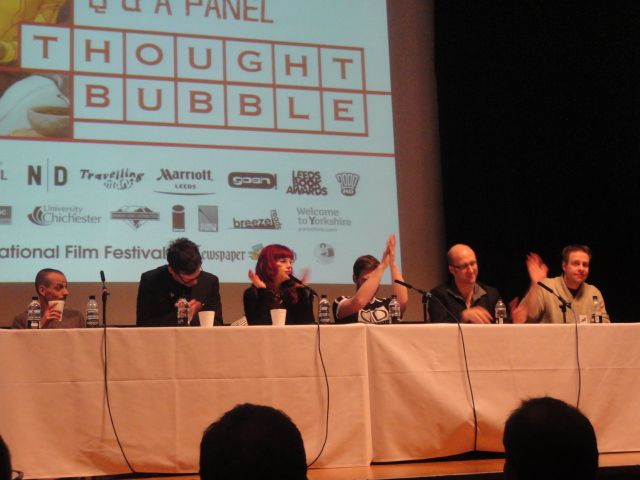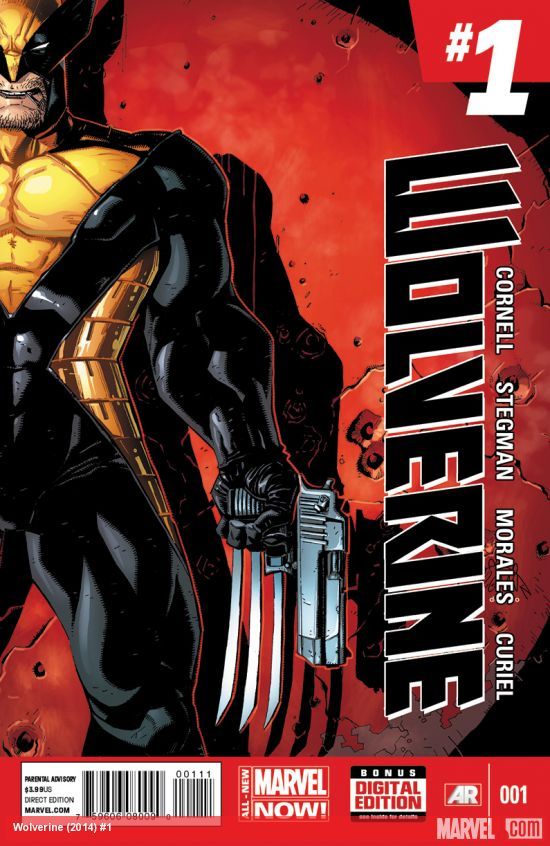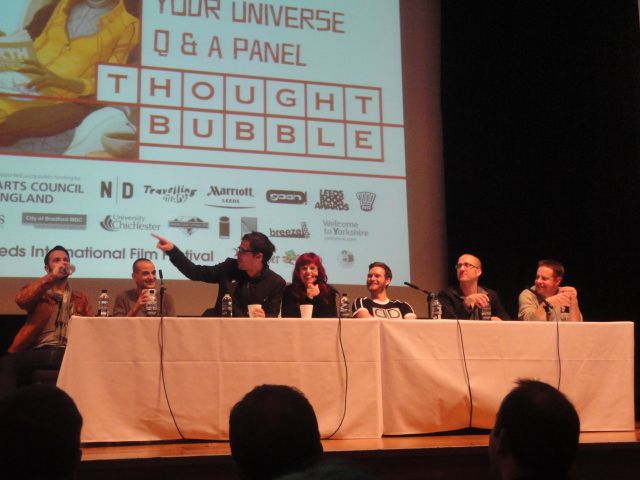Marvel Comics senior editor Stephen Wacker and senior vice president, creator & content development C.B. Cebulski held court Saturday at Thought Bubble in Leeds for an extended audience Q&A session dubbed "Marvel: Your Universe," along with "Wolverine" writer Paul Cornell, recently announced "X-Force" writer Simon Spurrier, "Iron Man" writer Kieron Gillen, "Captain Marvel" writer Kelly Sue DeConnick and "Hawkeye" artist David Aja. The audience was then surprised by the arrival of "Hawkeye" writer Matt Fraction and recent "Uncanny X-Force" artist Ramón Perez, who both joined the panel -- Fraction with an armful of coffee for the other panelists.
The first question was addressed to everybody, with a member of the audience asking what the most difficult part of being a comic creator was.
"Pronouncing Kieron Gillen," Wacker replied. "Answering this question," Gillen said. "Meeting a deadline," DeConnick answered.
Spurrier said that he thought the most difficult job was "the second one;" people are paying more attention once your foot is in the door. Gillen added that ending his run on "Journey Into Mystery" was very hard.
Wacker addressed the question to Perez, asking if it was difficult for an artist to work from a blank page. Perez said that it was tough to make sure that you felt the quality of work was high enough. The better an artist does, the more people pay attention to your work, and the more stress arises to keep that quality up.
Cebulski spoke from an editorial standpoint, saying that he found it hard to ask people to change their work, especially in the beginning. Aja added that he found it tough when he was asked to change his art -- especially when the editor was right. Fraction said that he'd gone for a vacation during production of "Hawkeye," and got an email one morning from Aja which said, "Quick, just need to know -- what does everyone in the building smell like?"
This led to a quick discussion of that issue of "Hawkeye" (#11, the Pizza Dog-focused issue), which Fraction said was meant to be a break for Aja. This was originally planned to be a text story first and foremost, but then built slowly into the issue that was eventually released, with icons and labels everywhere.
Somebody asked Fraction about how he first pitched "Hawkeye" to Marvel. Fraction said that he'd originally pitched the story and then backed out. He'd just finished a comic about Osama Bin Laden for "GQ," which had required a lot of research, and he pitched the second "Hawkeye" story, "The Tape" with Bin Laden as the target of the assassination attempt. Feeling this was just a one-arc story and not a series pitch, he withdrew.
He then had the idea for how to write "Hawkeye" as an ongoing, causing him to call Marvel and ask if he could re-pitch the book. Wacker said that once the book had been approved, Marvel had basically left the creative team alone to do what they want.
Fraction said that once he got the mental picture of Hawkeye with the bandages and plasters on his face, the whole series clicked into place for him. Once that was sorted, he pitched to Marvel on the basis of character -- not mentioning anything about the more idiosyncratic elements of the book, like Pizza Dog. Gillen said that this was also how he'd got away with the things he'd been able to do in "Journey Into Mystery." He pitched character foremost, and just didn't mention the weird stuff to his editors.
The panel was then asked about the most gratifying part about making comics, and Gillen immediately said, "That I know someday Jamie will die," referring to his frequent collaborator Jamie McKelvie. He then said that he found it gratifying when a story means as much to somebody else as it has to you.
Fraction gestured to the crowd and said, "It's you." He said that over the weekend he's met people dressed as Kate Bishop, Clint Barton, Carol Danvers and others. He said that he knows the books have an audience, but when that audience actually shows up in person, in costume, it's immensely gratifying.
DeConnick spoke of the Carol Corps, which drew cheers from the crowd. She said that she gets a lot of mail from fans, particularly in reference to the "Down" arc of "Captain Marvel." In that arc, the character was struggling with a physical disability, and found it difficult to deal with the issue and felt uncomfortable. DeConnick got letters from fans with multiple sclerosis, saying how the storyline rang true to them, and how it gave them hope.
Spurrier said that he's also received letters from fans, regarding his writing of Legion in "X-Men Legacy." He said that being a writer is a very privileged position, and that it's spectacular when you write something that changes somebody else's life for the better.
Cornell said that he loved the cosplay aspect of conventions; and also the feeling when you can sense the audience is coming around to a series. He spoke of the idea of when readers on message boards start off hating an idea, but then start to find things they like about it -- and ultimately come around to loving it. "The last thing you want as a writer is no response to a comic."
The panel was asked about writer's block, and how they dealt with it. Aja said that he encounters this himself every month, and that the only way to get past it is to "work." For the most part, the writers weren't keen on the term -- DeConnick said "think of it as courage block;" Cornell, "you'll rewrite the words later anyway, so just get something down for now."
DeConnick said, "You have to give yourself permission to suck," before then recommending that everybody write that down, or at least tattoo it on their necks. Continuing, she said that everything seems great in your head, but getting those ideas out in one piece can be overwhelming. Ideas are easy, and constantly arrive -- being a pro is about doing all the work that puts those ideas onto paper. "It's better to express an imperfect idea than to be a great potential writer."
Commenting on what kept him through writer's block, Fraction said that he remembered a scene from the film "Ed Wood." In that, the legendarily bad director was trying to pitch a new movie to producers, despite his last one going badly. Fraction said that the line, "but my next one will be better" had always stuck with him.
Aja said, "You just have to work and work." He said that he'd done 20 pages of art, found that it didn't work for him, and so he trashed them and started again. This led Wacker to tell the audience, "This is why you waited so long for the next 'Hawkeye' issue!" prompting laughter.
Spurrier said, "It's more about inertia than it is about being a block." Gillen replied, "You may also just be lazy."
Next question from the crowd: "Which work are you least proud of?" which led to oohing from the crowd. Cebulski picked up the microphone and joked, "Let me answer this one for all of them!"
Cornell mentioned a miniseries he wrote where he decided to write in the whole backstory of the character as part of a subplot -- but also had a second subplot running at the same time. Spurrier had a similar worry about being too elaborate for a story, regarding a one-shot he did which flicked backwards and forwards through time. After finishing writing, he realized that there wasn't actually any need for the time to jump around in the first place.
DeConnick had to once rewrite an issue in order to devote more pages to a popular character, and that meant she had less page space to write about the characters she'd wanted to focus on. She also remembered that the villain of that story killed a dog, although a new dog was introduced at the end. This led Spurrier to ask, "You put a dog in the fridge?"
To counterbalance the question, the panel was asked what story they were proudest of. Gillen referenced "Uncanny X-Men" #14 and "Young Avengers" #13 as two of his favorites. Spurrier said he was proud of his "X-Club" miniseries he wrote a few years back. Cornell listed his run on "Captain Britain and MI13," as well as his current run on "Wolverine."
DeConnick said that she felt she was better at one shots than long stories. She mentioned issues #1, #9, and #17 of "Captain Marvel" as her favorites. DeConnick also said she was proud of the unexpected pairing of Hulk and Spider-Woman in "Avengers Assemble."
Perez said that he loved all his work when it came out, but then afterwards all he can see are the mistakes. He spoke about a graphic novel he drew in 1999, which was later collected in 2007. He re-lettered it digitally for the new release, and as a result found himself tweaking parts of the dialogue -- and then finally parts of the art as well. He said that he realized he had to let it go and not "Lucas" it.
Aja agreed with the sentiment. He said that he looks at things he did years ago, like "Immortal Iron Fist," and he can see issues with the work. He said, "If I felt I'd done the perfect comic, I wouldn't want to do more". He also said he loved the collaborative process of the whole art team together, from design to colors to letters.
Spurrier added that he liked that he could sign off and finish his part of the comic, and then still be surprised when the art comes in. Gillen said, "You can be an audience for your own story."
The panel was then asked if they found it hard to build their own identity as writers on established properties and characters. Three or four of the writers answered "Nope!" at the same time, and the questions then moved on.
They were asked if they had any advice for getting into comics, and especially how to network at a convention. Spurrier advised them all to "kill McKelvie." Gillen corrected this, saying they should "wait until he finishes four more pages for me, and then do it."
The panel advised people not to worry about breaking in, but to worry instead about making something good. DeConnick said she was now worried about Jamie McKelvie: "I want to take him into protective custody."
The final question asked the panel if they ever felt sad after completing a story they'd spent a long time working on. This led Gillen into an extended metaphor about building a cat flap for his house, and how it feels satisfying, but not immediately sad for being finished.

